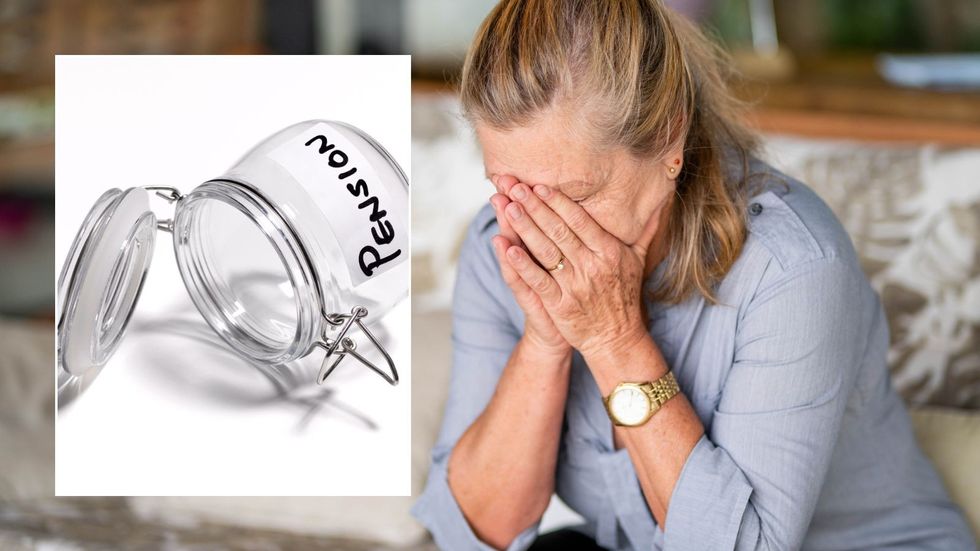Pensioner Sue Ashcombe Hurt gives the government suggestions for pensioners
GB NEWS
Many retirees could be set to empty their pension pot by their late 70s
Don't Miss
Most Read
Latest
Retirees may be at risk of depleting their pension pots a decade earlier than expected as they overlook a common step in retirement planning, new research suggests.
Some retirees could face a shortfall of up to nine years once their retirement funds are exhausted.
The findings show that a growing number of retirees are taking large cash lump sums and withdrawing excessive monthly income, without fully understanding the drawdown rules or their tax free allowances.
Analysis shows that for those without additional income sources, such as property wealth or defined benefit pensions, retirement savings typically run out by age 77 - well short of the average life expectancy - which is 86.
Experts attribute this trend to what they call the "Lottery Effect" - where sudden access to large sums of money can trigger impulsive spending decisions similar to lottery winners.
One in seven retirees report viewing their pension cash lump sum as an unexpected financial bonus rather than part of their long-term savings strategy, research from Legal & General found.

Many retirees could be set to empty their pension pot by their late 70s
GETTYA further one in 10 described it as feeling like a payday they wanted to spend. Over a fifth of retirees took or would consider taking a cash lump sum to place in a current account or cash ISA for a "rainy day."
Additionally almost half accessed their pension cash simply because they could, wanting to have it readily available - potentially exposing themselves to unexpected tax bills or loss of means-tested benefits.
Katharine Photiou, Managing Director Workplace Savings at L&G said: "The Lottery Effect’ for some savers, can lead to unsustainable spending. On top of this, with unused pension savings also subject to IHT from 2027, it could add to people withdrawing from their pots in an unsustainable way."
She suggests taking out pension funds without proper planning or financial advise is a major mistake that could leave people with nothing towards the end of their lives.
LATEST DEVELOPMENTS:
The average pension pot stands at £87,500 before retirees begin accessing their funds, according to L&G's research. A third of people opt to take a cash lump sum as soon as they become eligible, typically at age 60.
Those accessing their pension commonly withdraw 25 per cent of their pot - the maximum tax-free allowance - and then take an average monthly income of £875 once they reach state pension age.
However those without alternative income sources are warned that without taking the time to speak to a professional, they could be left with nothing by the age 77 - creating a significant gap before end of life.
Photiou warned: "What seems like financial freedom now might turn into uncertainty later. Everyone’s situation is different, and some people may turn to other potential sources of income, such as their property, to make up the shortfall.
"Regardless of how you’re thinking about funding your retirement, seeking guidance can ensure you fully understand your options, helping you to make the best choice for you.
“There is free support and guidance available for everyone wanting to make more informed decisions, and it is worth speaking to your provider to understand what is on offer.
"For example, L&G has launched a Guided Retirement Planner for all our workplace members to help ensure that more people can afford the retirement they would like to have.”
While retirees generally expect their pension pot to last 22 years from age 60, L&G's analysis indicates this timeline is often unrealistic.
 Pensioners are worried about the future of their retirement GETTY
Pensioners are worried about the future of their retirement GETTYOne in seven retirees who have accessed their pension cash admit having regrets about their spending decisions or withdrawing more than planned.
Among those with regrets, 29 per cent faced unexpected costs, while 26 per cent felt they could afford their spending at the time.
Around 58 per cent of those surveyed accessed their pension without seeking any formal advice or guidance from their provider, an independent adviser, or support services like MoneyHelper which is a common mistake.
Of those expressing spending regrets, more than one in 10 confessed they didn't fully understand the implications of their decisions.
Dr Emma Hepburn, clinical psychologist explains how psychological factors influence spending decisions: "Our biases can influence what we do with our money, potentially resulting in inadequate planning for the future or making us more likely to spend too much in the here and now."
She points to "hyperbolic discounting" as a key factor, where people choose immediate gratification over future benefits, even when long-term rewards may be more beneficial.












